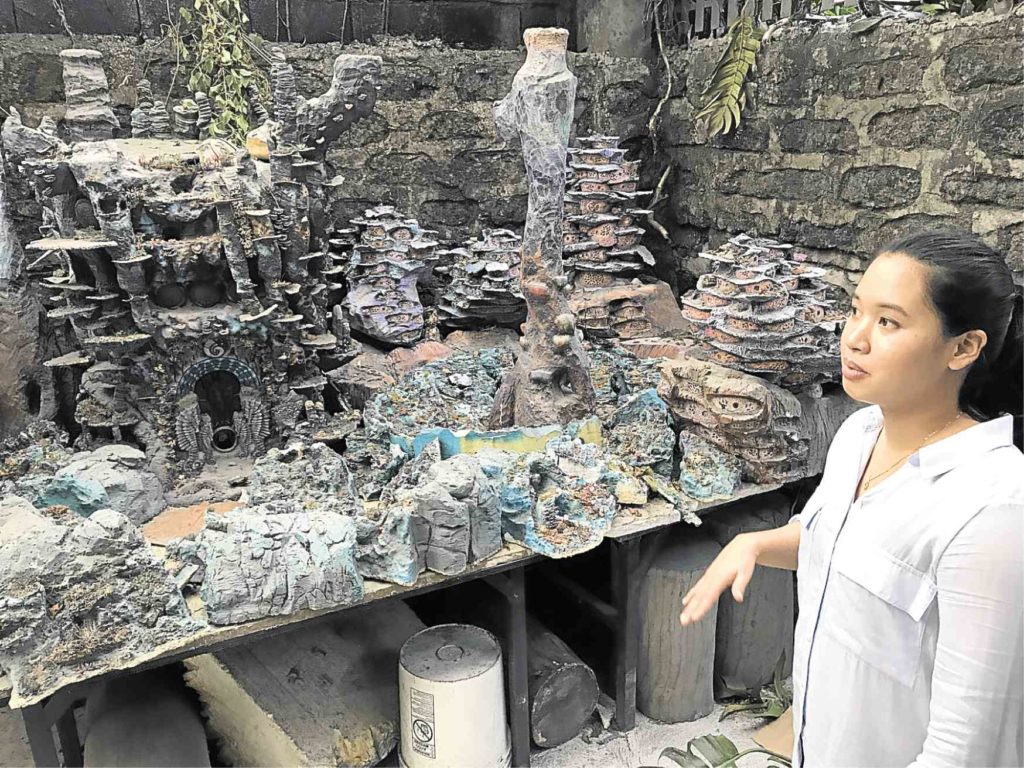Unmasking the real face behind prosthetics

Transforming ordinary people into blood-thirsty zombies or breathing life into inanimate mythical creatures may look fantastic on the local big screen, but behind every prosthetic mask and face paint are Filipino special effects artists struggling to ensure their works don’t look “cheap” despite lack of funding and support.
One of those artists is Lora Ledesma, founder of special effects and makeup laboratory Octopod Inc.
“It’s always a fun reaction to see when people ask what I do. ‘Oh, I make monsters,’” the 26-year-old said in an exclusive interview with INQUIRER.net.
What is not fun are the struggles to improve the local craft, with the entertainment industry more focused on melodrama rather than fantasy, seasonal demand and an audience quick to dismiss Filipino special effects as “cheap.”
But such struggles for Ledesma are not setbacks, and instead rooms for improvement for the local special effects industry.
“I saw the room for improvement and I saw that there’s something that I can do about it, given the skill set and the resources that I had, it was possible, I can make a difference. I could at least try,” she said.

Ledesma shows the miniature set, made mostly from styrofoam, that was used as a central part of a fantasy television series. —CONTRIBUTED PHOTO
From Halloween to ‘Encantadia’
Octopod is one of three companies in the Philippines that offer special effects makeup and miniature design services for local films and TV series.
The company started out with only two employees in September 2013, painting the faces of zombies for the Outbreak Manila zombie fun runs.
Ledesma’s first big break was in early 2014, when the company built the miniature sets for the TV series “Dyesebel.” She would later spearhead the manufacturing of the animatronic encantado “Imaw” from the 2016 series “Encantadia,” among other projects.
Ledesma didn’t have to start from scratch when she chose to be a special effects artist, having been exposed to the art of prosthetics from an early age.
Every Halloween growing up, Ledesma shared that she would get to play with prosthetics, costumes and gelatins–and even fake blood–loaned by her father’s friend. “Every single Halloween growing up, we would win the scariest or best costume,” she said.
“It started with taking some painting lessons here, sculpting lessons there, even if it meant sculpting with a bunch of 7-year-olds in the class [while I was in college]. I took it anyway to see if this is really what I wanted to do,” she added.
The idea to start her own special effects business, however, stemmed from a course requirement while studying business entrepreneurship at Enderun Colleges. She named the company Octopod after the the octopus and its ability to change its physical form.
“Part of the course was to search what you wanted to do in life and I decided that what I really want to do is to find work where I can sculpt and paint and still apply the college learnings that I had,” she said.
Included in her business plan was to invest in her craft. Before graduating from Enderun in 2014, she also spent the year 2012 in the United States to study cinema makeup, sculpting and digital effects.
‘Cheap’ special effects
But while Ledesma had worked hard to start her business and hone her craft, she still today cannot escape the criticism from nonreceptive Filipinos over the supposed “cheap” quality of Philippine special effects.
While local fantasy shows generally earn positive feedback for their improving special effects, local movies instead receive plenty of criticism. For horror films like “Shake Rattle and Roll,” a major caveat is that the makeup on monsters is not at all scary.

Zombified Inquirer.net intern, Daphne Galvez
Ledesma credits the negativity to the high standards that Hollywood films have set for the Philippine audience.
“It’s so easy to notice these things. It’s so easy to say, ‘ang cheap naman ng Pilipino (Filipinos are so cheap’ because you can easily spot the difference, when you just compare the Hollywood film to the Philippine film,” she said.
In reality, local films really are “cheaper” because Philippine production companies would rather scrimp on special effects to focus more on their audience’s interests: melodrama over fantasy or science fiction.
Local production houses usually budget only P40,000 to P150,000 per film or TV character, depending on the complexity of the work to be done. In comparison, production houses in the United States allot at least $7,000 (over P350,000) per character.
Erratic production schedules is another hurdle for Octopod’s artists to exhibit their craftsmanship. Most big budget films come out only in the last quarter of the year, taking a break from shooting after the Metro Manila Film Festival in December.
“These rates do not yet including the makeup artist’s talent fee per shooting day,” Ledesma added. “These are just to manufacture the prosthetics.
“They’re not really looking for quality prosthetics. They’re looking for the catfights, the drama,” Ledesma said. “So it’s very risky for production houses to risk a lot of money in prosthetics when it’s not an added value that their target market really needs or requires.”
Irregular schedules, employees
Erratic production schedules is another hurdle for Octopod’s artists to exhibit their craftsmanship. Most big budget films come out only in the last quarter of the year, taking a break from shooting after the Metro Manila Film Festival in December.
“Sometimes for the next three months you can have projects, but in the next three months you won’t have any,” she said.
Irregular production schedules also result in irregular employees. Some months she would work with as many as 40 artists, but only work with a fraction of that on other days.
Between 2015 and 2016, Octopod got many projects. But when projects did come all at once, the young entrepreneur realized that the demanding environment of film and television “became too much.”
“It wasn’t just emotional [exhaustion], it’s also physical [with prosthetics],” Ledesma said, recounting the many sleepless nights she endured to finish all the projects. “You have to be there. You can’t be missing in action.”
“Commitments everywhere. And just trying to satisfy all your constituents and I felt like I lost myself trying to make everyone happy,” she added.
To recuperate and refocus, Ledesma took a break from the business after her projects wrapped up in December 2016. Five months later, she was back on her feet.
“After so much reflection and prayer, I decided to come back to business because I believe God set me on this path for a reason,” she said. “He formed me to be an artist and an entrepreneur. And until I’ve exhausted all my means and my strength to make this work, only then will I truly stop. Or perhaps not even then.”
“Right now, I think the business is still on survival mode, but I guess I’m wiser now, and a little better, knowing that I survived that and knowing that I mustn’t do that ever again,” she added.
Future plans and working abroad
Ledesma hopes that the country will someday develop a greater appreciation for the special effects industry.
“My long term plan for Octopod is that the whole nation gets into the craft, that we develop artists that can do what the Hollywood artists can do, and have a stable enough industry that can support all those new jobs, all those new artists,” she said.
“We want to develop the artists, develop the craft, bring in products because the Filipino people have so much talent,” she added. “I want our special effects in our movies to be just as good as Hollywood.”
Ledesma has taken it upon herself to continue Octopod in the Philippines, in the hopes of contributing to the evolution of the Philippine special effects industry into a craft that her countrymen will be proud of.
“I think the best way I can contribute to the craft here in the Philippines it to just keep finding a way to grow and grow with others along the way and not give up,” she added.
That dream is the reason she has chosen to stay in the Philippines, despite being offered jobs abroad and being asked to compete elsewhere.
“If I’m going to grow in this craft, I want it because I’m in my own land,” she said. “If I lose the will to keep going, who’s going to take care of this business? Who’s going to pick it up?”
